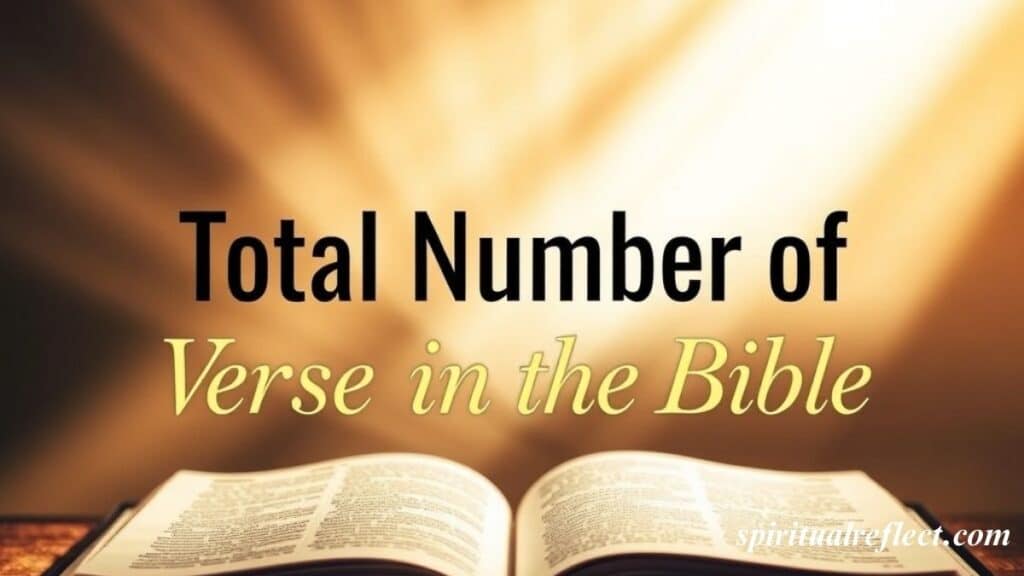“How Many Verses Are in the Bible?” refers to the exact count of verses contained within the sacred text, divided across the Old Testament and New Testament. In the King James Version (KJV), the Bible contains 31,102 verses—23,145 in the Old Testament and 7,957 in the New Testament. These verse numbers vary slightly depending on translations and canons, yet they form the structural backbone of the world’s most influential religious book.
What makes this number so captivating is not just its size but its significance. Each verse carries history, poetry, law, prophecy, letters, and wisdom. Some verses are long and complex, while others, like “Jesus wept,” are short yet profound. Together, they weave a narrative that has guided faith, culture, and literature for thousands of years.
The study of How Many Verses Are in the Bible? goes beyond simple counting. It opens the door to fascinating insights about Biblical structure, translation differences, and even the story of how verses were first divided. Understanding verse counts helps readers appreciate the depth of Scripture, while also revealing the rich diversity found across different versions of the Bible.
Total Number of Verses in the Bible

The most widely cited figure is 31,102 verses in the King James Version (KJV) of the Bible. This version remains one of the most referenced when discussing Biblical structure.
However, not all Bibles have the same number of verses. Translation differences and canonical variations can add or remove verses. For instance:
- King James Version (KJV): 31,102 verses
- New International Version (NIV): 31,173 verses
- Douay-Rheims Catholic Bible: Around 31,219 verses (due to inclusion of the Deuterocanonical books)
- Orthodox Bible: Higher verse count because it includes books like 3 Maccabees and Psalm 151
So, while “31,102” is the common number, the total verses in the Bible depends on which religious text you’re reading.
Breakdown by Testament
Old Testament
The Old Testament is longer than the New Testament, both in chapters and verses. The Protestant canon contains 23,145 verses.
But here’s where it gets tricky. The Catholic Old Testament includes the Deuterocanonical books, adding more verses, while the Orthodox canon has even more additions.
Book-by-Book Breakdown (Protestant Old Testament)
| Book | Verses |
|---|---|
| Genesis | 1,533 |
| Exodus | 1,213 |
| Leviticus | 859 |
| Numbers | 1,288 |
| Deuteronomy | 959 |
| Psalms | 2,527 |
| Isaiah | 1,292 |
| Jeremiah | 1,364 |
| Ezekiel | 1,273 |
| Minor Prophets (combined) | Varies |
➡️ Fun fact: Psalms has the most verses of any book in the Bible, while Obadiah has the fewest in the Old Testament with only 21 verses.
New Testament

The New Testament is much shorter but highly central to Christian doctrine. The Protestant canon contains 7,957 verses.
Book-by-Book Breakdown (Protestant New Testament)
| Book | Verses |
| Matthew | 1,071 |
| Mark | 678 |
| Luke | 1,151 |
| John | 879 |
| Acts | 1,006 |
| Romans | 433 |
| Revelation | 404 |
➡️ Fun fact: Luke has the most verses of any Gospel, making it the longest Gospel account by word count as well.
Unique Features of Bible Verses
The Longest Verse
- Esther 8:9 is the longest verse in the Bible. It runs for over 80 words in English translations, detailing a royal decree in intricate detail.
The Shortest Verse
- John 11:35 simply states: “Jesus wept.” Despite its brevity, it captures deep theological and emotional weight about Jesus and His compassion.
Other Notable Verses
- Genesis 1:1: “In the beginning, God created the heavens and the earth.” — a cornerstone for creation and faith.
- John 3:16: Known as the “Gospel in a nutshell,” summarizes the salvation message.
- Romans 8:28: A key verse in Christian faith about God’s purpose in trials.
Variations Across Translations
Not all Bibles line up verse-for-verse. Here’s why:
- Verse numbering differences: Some verses appear in certain translations but not in others. For example, Matthew 17:21 appears in the KJV but is omitted in the NIV.
- Combined verses: In some Scriptures, what’s split into two verses in one translation may be merged in another.
- Apocryphal additions: Catholic and Orthodox traditions include verses not found in Protestant Bibles.
Case Study: The story of the woman caught in adultery (John 7:53-8:11) is present in the KJV but often footnoted in modern translations due to manuscript evidence.
Historical Development of Verses

The Bible’s original manuscripts didn’t have chapters or verses. Ancient scrolls were written continuously without breaks.
- Chapters were added by Stephen Langton in the early 13th century.
- Verses were introduced by Robert Estienne in 1551 when he published a Greek New Testament.
Before this, believers memorized Scripture by phrases and context. The addition of verses revolutionized Biblical study, allowing for quick reference and deeper analysis.
Interesting Facts About Verse Counts
- Most verses in a single book: Psalms (2,527 verses)
- Fewest verses in a book: 3 John (14 verses)
- Longest chapter: Psalm 119 with 176 verses, structured as an acrostic poem.
- Shortest chapter: Psalm 117 with only 2 verses.
➡️ Analogy: Think of the Bible like a vast library. Some “books” are sprawling encyclopedias (Psalms, Isaiah), while others are brief letters (Philemon, 3 John).
Why Verse Counts Matter
At first glance, counting verses may feel like trivia. But it actually holds deeper value:
- Study and memorization: Verses allow Christians to quote Scripture precisely.
- Theological importance: Knowing key verses strengthens faith and doctrinal clarity.
- Textual comparison: Verse numbers help highlight translation differences and textual variation.
- Historical context: Understanding verse development shows how the Bible evolved as a religious text.
Conclusion
So, how many verses are in the Bible? The answer depends on which version you read. In the King James Bible, there are 31,102 verses, divided between 23,145 verses in the Old Testament and 7,957 in the New Testament. But across Catholic, Orthodox, and modern translations, that number shifts slightly.
What never changes, though, is the core message of the Bible: God’s covenant, prophecy, and ultimate salvation message through Jesus Christ. The verse structure is just a tool, but it makes the world’s most influential sacred text accessible to every generation.

Rana Ahmad is the creator of Spiritual Reflect, where she shares insights on personal growth, mindfulness, and meaningful living to inspire a more intentional life.







